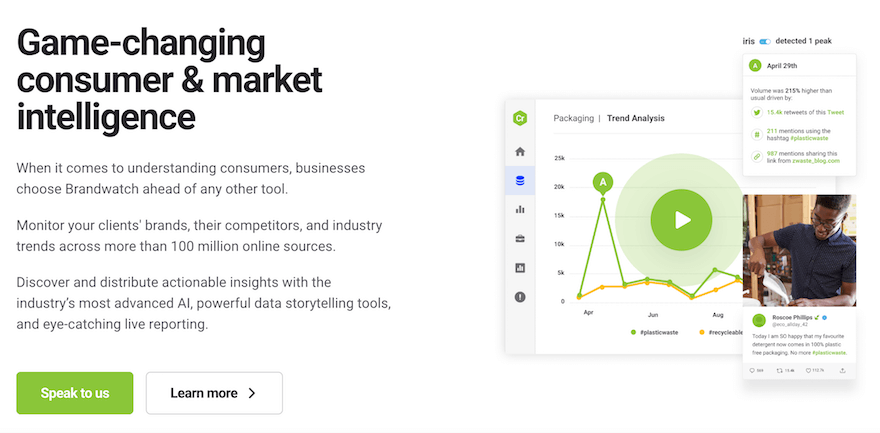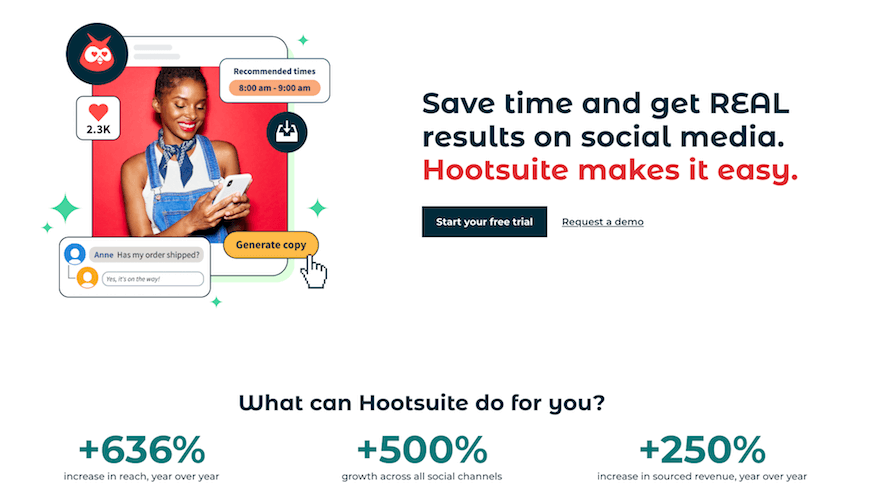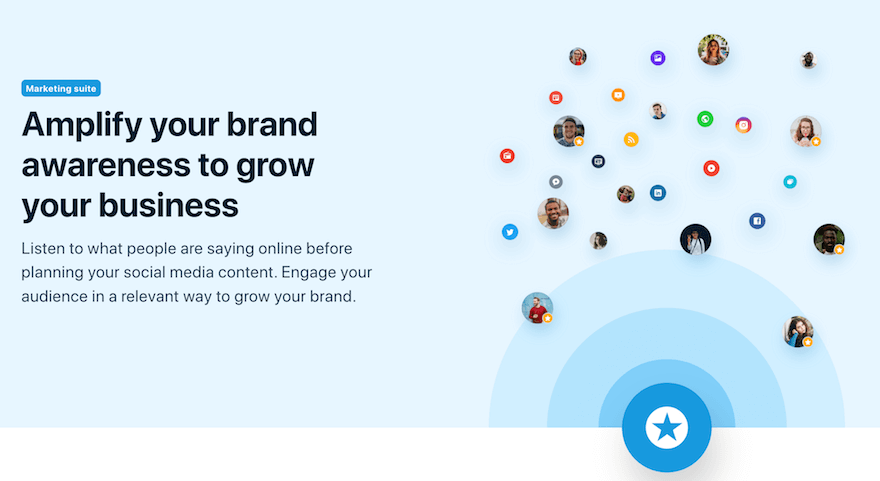What Is Social Listening and Why Is It a Powerful Tool for Your Business?
Our independent research projects and impartial reviews are funded in part by affiliate commissions, at no extra cost to our readers. Learn more
Social media is one of the most powerful levers your business can pull to grow online. After all, 60% of the world’s population uses social media – and for an average of a whopping two hours and 24 minutes per day. Think of all the conversations there that your business could be tapping into – if, that is, you have the right approach.
Social listening gives you the tools and techniques you need to unlock the power of public perception – to understand what your audience is saying about you online, and harness these insights to refine your products, resonate with your customers, and grow your business.
Below, we’ll answer the question “what is social listening”, and explain why it’s a must for your brand. We’ll also provide a few social listening examples – that is, three tools your brand can benefit from today – and offer up our top social listening tips.
Ready to stop merely talking to your customers… but actually listening to them, too? Read on!
What Is Social Media Listening?
Social listening (also known as “social media listening”) is the process of monitoring and analyzing online conversations, discussions, and mentions across different social media platforms: plus a whole range of blogs, forums, and other online channels.
The goal? To gain insights into what people are saying about your brand, products, industry – or whatever topic your business is most interested in – in real time. This helps you understand public perceptions of, and sentiment toward, your business. It also allows you to track trends as they emerge and develop, using feedback to refine your brand’s approach.
Why Is Social Listening Important?
Social listening is important for a wide variety of reasons – we’ll unpack each, in detail, below.
Brand Reputation Management
With social listening, you can monitor and manage your business’s online reputation by tracking mentions and sentiment. Through this, you can quickly address negative reviews, comments, or concerns – and maintain a positive brand image.
Competitor Analysis
You can use social listening tools and tactics not only to track insights about your own brand but those of your rivals’, too. To this end, social listening can help you better understand the strengths and weaknesses of other companies in your niche, and inform effective competitive strategies and market positioning.
Product and Service Improvement
Analyzing social media discussions that are relevant to your business’s offerings can help you gather important feedback about your products and services: guiding improvements, fueling innovation, and enabling you to better meet your customers’ evolving needs.
What’s more, by getting to grips with audience sentiment around not only your products – but the similar stock and services your competitors are selling – you can refine product development to align with your audience’s expectations.
Customer Engagement and Loyalty
Engaging with your customers directly through social listening fosters a sense of connection with, and loyalty toward, your brand, helping you build a positive and enduring relationship with your audience.
Market Research and Trend Analysis
Social listening helps you identify emerging trends and topics, guiding strategic planning, and keeping your business one step ahead of your industry’s shifting sands.
Better still, because social listening works in real time, you’re well placed to act on these evolving situations not days, weeks, or even months down the track – but right now. You can make quick, informed decisions to propel your marketing campaigns or respond to topical trends while they’re still relevant.
Top Social Listening Tips
Ready to get your business’s social listening efforts off the ground? Here are our top tips for getting started with social listening – and then growing and managing your endeavors ongoing.
Getting Started with Social Listening
To begin, be sure to:
- Clearly outline your social listening goals and objectives. Reputation management? Competitor analysis? Trend identification? This clarity will help guide your strategy.
- Choose the right tools – we’ll cover our top social listening platforms below.
- Identify the keywords, hashtags, and phrases most relevant to your brand, industry, or products – these are what your social listening strategy will be tracking.
- Use your social listening tool to set up alerts for real-time notifications for the terms you outlined above.
Growing and Enhancing Your Social Listening Practices
To expand your efforts, try:
- Expanding your keyword list regularly as your brand and industry evolve.
- Incorporate Boolean operators (AND, OR, and NOT) to make your queries more specific. This will filter out irrelevant mentions and provide more accurate insights.
- Group social mentions into categories for deeper analysis. This segmentation could include sentiment, demographic, or geographic location analysis.
- Engage actively in conversations with your audience to demonstrate responsiveness and bolster your brand’s online presence.
Tracking and Monitoring Your Social Listening Practices
To manage your social listening strategy, explore:
- Regularly reviewing your social listening analytics: tracking key KPIs such as sentiment trends, share of voice, and engagement metrics.
- Compare your social listening data to your competitors (“benchmarking”) to identify your strengths and weaknesses.
- Combine your social listening data with other sources – such as customer surveys, sales data, and website analytics – for a more holistic approach.
Invest in training to ensure your team is well-versed in your chosen social listening tools, and are well-equipped to interpret the data they provide.
3 Social Listening Tools to Make the Job Easier
Looking for a bit of help with your social listening strategy? We don’t blame you – keeping tabs on the entire internet is no mean feat!
Fortunately, there’s a litany of social listening tools (also known as social media monitoring tools) to help.
What are social media monitoring tools, you ask? Well, they’re platforms to help you monitor and analyze conversations, mentions, and discussions relevant to your brand from across the web. They harness advanced algorithms and analytics to track the keywords, phrases, and hashtags most important for understanding and growing your business.
Here are three we love.
1. Brandwatch
Brandwatch is one of social listening’s industry-leading tools, with specific plans targeted at researchers, influencer marketers, and social media managers respectively.
Having scooped several big G2 awards in 2023, Brandwatch is a popular and versatile social listening tool with a wide range of applications and use cases. Its only real drawback is its lack of phone-based support – you’ll have to complete an enquiry on its website for service, and even this is only available Monday to Friday.
What’s more, its pricing isn’t transparent, and you’ll have to book a meeting with the Brandwatch team to learn more about how much your business can expect to pay.

2. Hootsuite
Trusted by over 200,000 brands – including household names such as IKEA, Domino’s, and Allianz – Hootsuite is a great, tried-and-tested social listening solution.
You can get started with a 30-day free trial on either Hootsuite’s ‘Professional’ plan ($99/month) or its ‘Team’ plan ($249/month). The former enables one user and 10 social accounts; the latter three users and 30 accounts. For a package that includes five users and up to 50 social accounts, the ‘Enterprise’ plan is available with custom pricing.
Hootsuite’s customer support ticks all the right boxes, too: you can get in touch with the social listening tool’s team from your Hootsuite dashboard, email your account rep for support, or submit a request directly through its website.

3. Mention
Mention is ideal for businesses looking not only for a complete social listening tool, but for one keen to analyze its competition, manage its social media efforts, and keep tabs on perceptions of its brand.
Highly rated on G2 and with heavy-hitting brands such as Microsoft and Deliveroo for customers, Mention’s prices are both refreshingly transparent and surprisingly affordable.
You’ll pay just $41/month to get started with Mention’s ‘Solo’ plan (which includes one user, one account per social network, two alerts, and 5,000 mentions). Upgrading to the ‘Pro’ plan ($83/month) adds more users, social accounts, mentions, and alerts, while the ‘ProPlus’ plan ($149/month) offers unlimited users, 15 social accounts, and up to 20,000 mentions.
The ‘Company’ plan offers the most comprehensive level of social listening at a bespoke price.

Challenges and Ethical Considerations
Like many of the most effective business strategies, social listening isn’t without its challenges – and comes with its fair share of ethical considerations, too.
Let’s break them down.
The Challenges of Social Listening
Social listening’s drawbacks include:
- Data privacy concerns: because you’re collecting and analyzing publicly available data, it’s vital that you respect privacy rights, and avoid infringing on personal boundaries. You’ll need to ensure you’re collecting data in a way that complies with privacy regulations, and – where necessary – obtain consent from users, especially when dealing with their sensitive information.
- Accuracy and bias: automated sentiment analysis tools can struggle when it comes to accurately interpreting nuanced language, which can skew the data you collect. What’s more, social media data can contain biases based on the demographics of the platform’s user base, which can also impact the reliability of its insights.
- Volume and noise: the sheer volume of social media data out there can be overwhelming! So separating the chaff of all that irrelevant information (the “noise”) from the wheat of actionable insights can be difficult. It can also be tough to distinguish authentic conversations from automated or spammy content.
Social Listening: Ethical Considerations
With social listening, you’ll also have some things to consider from an ethical standpoint.
These include:
- Implementing transparent disclosure policies: clearly communicating social listening activities to users, customers, and stakeholders alike.
- Anonymizing and aggregating the data you collect: this helps prevent individual users from being identified.
- Providing users with clear consent and opt-out options: you must offer users clear options to opt out of social listening activities if they wish, and ensure you’re respecting their preferences at every turn.
To overcome social listening’s myriad challenges – ethical or otherwise – training can help. And not only for your staff, either, but for the social listening tools and algorithms you use. Filtering and prioritization techniques can help cut through the noise while adding diversity to your data sources can help minimize and mitigate the effects of bias on your social listening data.
Summary
Above, we’ve provided a definition of social listening, and explored its wide – and indispensable – range of benefits for your business. From helping you understand your audience and position in the market to providing insights into how to promote your website, social listening’s benefits can’t be ignored.
And neither, as it turns out, can your customers – so get started with one of the social listening tools above (in Hootsuite’s case, for 30 days at no cost) to start listening to them.
We’d love to know how you found this article, and if there are any social listening tips you love that we haven’t touched on here, so make sure to leave your thoughts in the comments below.
Before you go, be sure to check out the range of other articles we have here on Website Builder Expert. Whether it’s our top digital marketing tips or the digital skills you need to learn, you’ll find all the knowledge you need to take your business to new heights. Enjoy!
FAQs
For more information about what a target audience is, our guide will help.
Social listening helps with all this – so go get stuck in!
Leave a comment